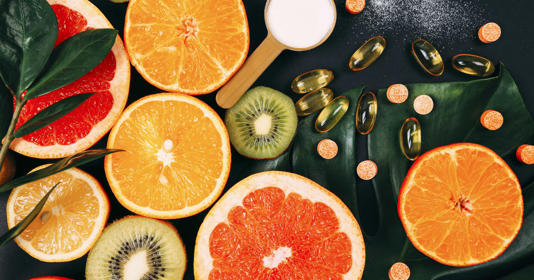
Cold and flu season is in full effect, which means many people are looking for ways to bolster their immune system and stay as healthy as possible this winter.
But does that mean stocking up on vitamin C and vitamin D? Not quite, says Dr. Michael Ben-Aderet, an infectious disease specialist and associate medical director of Hospital Epidemiology at Cedars-Sinai Medical Center.
“Most people, at least in [America], are able to eat a healthy diet and are able to get most of their vitamins from their regular diet. But I think there is still that concern, ‘Are people getting enough? Do they need more vitamins?’ and that’s where the role of vitamin supplementation comes into play,” Ben-Aderet says.
“Truth is, there’s never been any proven clinical benefit for vitamin supplementation in individuals that are able to get a normal, healthy diet and don’t have a clinical vitamin deficiency. That doesn’t mean that it’s impossible that they’re providing any benefit. It just means that we haven’t been able to prove the benefit.”
Though he notes that some people have severe, medical vitamin C and vitamin D deficiencies — which can lead to swollen, bleeding gums or bone fractures — and for those individuals, vitamin supplementation is a very effective and necessary measure.
Can vitamin C and vitamin D boost your immune system?
A 2013 Cochrane review of randomized controlled trials that examined the effects of taking vitamin C supplements daily on the prevention and treatment of the common cold found that taking the supplement every day didn’t reduce the incidence of colds. However, “it did at least reduce the severity and duration of colds,” says Dr. John Mafi, an associate professor of medicine in the Division of General Internal Medicine and Health Services Research at the David Geffen School of Medicine at UCLA.
It’s not untrue that vitamin C and vitamin D actually can help to support the function of your immune system. “Vitamin C enhances the body’s B-lymphocyte (B-cells) production, and stops the T-cells from deteriorating,” he says.
“Both of these are very important immune cells that are basically tasked with identifying and fighting bacteria and viruses.”
Vitamin D helps your body to create an antimicrobial peptide called cathelicidin, which “stops bacteria, microbes and viruses,” and “[regulates] the function of your body’s T-cells,” Mafi says.
Vitamin D supplements have a bit more evidence for their potential benefits. A systematic review of randomized controlled trials published in the British Medical Journal in 2017 found that daily intake of vitamin D supplements protected against acute respiratory infections. “It seemed to be the most effective in patients who had baseline vitamin D deficiency,” Mafi notes.
5 tried-and-true immuno-boosters
Yet, there are many proven ways to strengthen your immune system outside of supplements like vitamin C and vitamin D, Ben-Aderet says.
To boost your immune system, he recommends:
- Eating a healthy, balanced diet
- Exercising
- Prioritizing sleep
- Practicing good hand hygiene
- Getting vaccinated against circulating respiratory viruses
And if you really want to try vitamin C or vitamin D supplements, Ben-Aderet says: “The jury’s still mostly out [on their effectiveness], and vitamin supplementation is cheap and mostly harmless.”
Though, Mafi recommends always consulting with your doctor before taking any new supplement.
‘It’s always better to get vitamins from natural sources’
If you decide to take vitamin C supplements, you should make sure you don’t exceed 2,000 milligrams of vitamin C in a day, Mafi notes. Too much vitamin C can cause stomach issues like nausea and vomiting and kidney stones, according to Mayo Clinic.
Harvard T.H. Chan’s School of Public Health’s hub for nutrition information, The Nutrition Source, recommends a dietary allowance for adults 19 years and older of 90 milligrams for men and 75 milligrams for women.
“It’s always better to get vitamins from natural sources,” Mafi says. To get vitamin C, you can eat citrus fruits like oranges, grapefruit and lemons, he notes. Certain greens like kale and broccoli also have great amounts of vitamin C.
Taking “roughly 600 to 800 international units (IUs) of vitamin D per day,” is a way to safely address a deficiency, Dr. Jad Sfeir, a Mayo Clinic endocrinologist, told CNBC Make It in August of 2022. It’s best to find ways to get the vitamin in your diet from foods, Sfeir said, including fortified milk, orange juice or fatty fish like salmon or mackerel.
Having more than 4,000 IUs per day can increase your risk of toxicity, by greatly elevating the amount of calcium in your bloodstream and urine, Sfeir noted.
Source: CNBC
